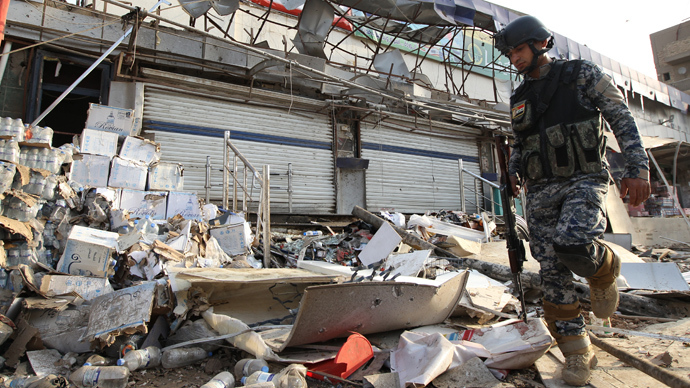Making the case for war: Dearlove doublethink on Iraq?

In a sensational article in a UK newspaper last weekend, the former head of MI6, the UK’s foreign intelligence agency, appears to have broken the code of omertà around the fraudulent intelligence case used as the pretext for the Iraq war in 2003.
Sir Richard Dearlove, former head of MI6 and current Master of Pembroke College, Cambridge, contacted the UK’s Mail on Sunday newspaper to say he had written his version of the (ab)use of intelligence in the runup to the US/UK invasion of Iraq. With the long-awaited and much-delayed official Chilcot Enquiry into the case for war about to be published, Dearlove is obviously aware that he might be blamed for the “sexing up” of the intelligence, and that 'Teflon' Tony Blair might once again shuffle off all responsibility.
You’ll no doubt have some vague recollection that, in the run-up to the 2003 Iraq War, the British government produced a couple of reports “making a case for war”, as Major General Michael Laurie said in his evidence to the enquiry in 2011: “We knew at the time that the purpose of the [September] dossier was precisely to make a case for war, rather than setting out the available intelligence, and that to make the best out of sparse and inconclusive intelligence the wording was developed with care.”
The first such report, the September Dossier (2002), is the one most remembered, as this did indeed “sexed up” the case for war as the deceased Iraqi weapons inspector Dr David Kelly exposed. It also included the fraudulent intelligence about Saddam Hussein trying to acquire uranium from Niger. It was this latter claim that Colin Powell used to such great effect at the UN Security Council.
Rupert Murdoch
Also, just six weeks before the attack on Iraq, the “Dodgy” Dossier, based largely on a 12-year old PhD thesis culled from the internet, but containing nuggets of raw MI6 intelligence — was presented by spy and politician alike as ominous premonitory intelligence.
Most memorably in the UK, it led to the bogus “Brits 45 minutes from Doom” front-page headline in Rupert Murdoch’s The Sun newspaper, no less, on the eve of the crucial war vote in Parliament.
Interestingly from a British legal position, it appears that Tony Blair and his spin doctor Alastair Campbell, released this report without the prior written permission of the head of MI6, which means that they would appear to be in breach of the UK’s draconian secrecy law, the Official Secrets Act (1989).
Thus was made the dodgy case for war. All lies — millions of deaths and many more maimed, wounded, and displaced, yet no one held to account.
Subsequently, there was also the notorious leaked Downing Street memo, where Sir Richard Dearlove was minuted as saying that the intelligence and facts were being fitted around the [predetermined war] policy.
On July 23, 2002 at a meeting at 10 Downing Street, Dearlove briefed Tony Blair and other senior officials on his talks with his American counterpart, CIA Director George Tenet, in Washington three days before.

In the draft minutes of that briefing, which were leaked to the London Times and published on May 1, 2005, Dearlove explains that George Bush had decided to attack Iraq and the war was to be “justified by the conjunction of terrorism and weapons of mass destruction.” While then-Foreign Secretary Jack Straw points out that the case was “thin,” Dearlove explains matter-of-factly, “the intelligence and facts are being fixed around the policy.”
There is no sign in the minutes that anyone hiccuped — much less demurred — at "making a case for war" and furthering Blair’s determination to join Bush in launching the kind of “war of aggression” outlawed by the post-world war Nuremberg Tribunal and the UN treaty.
The acquiescence of the chief spies helped their political masters mainline into the body politic un-assessed, raw intelligence and forged documents, with disastrous consequences for the people of Iraq and the world.
Yet Dearlove long remained unrepentant. Even as recently as 2011, post-retirement and bloated with honours, he continued to deny culpability. When questioned about the Downing Street Memo during an address to the prestigious Cambridge University Union Society by the fearless and fearsomely bright student, Silkie Carlo, Dearlove tried grandiloquently to brush her aside.
But were the remarks in the Memo really “taken out of context” as Dearlove tried to assert? No – the text of the Memo was clear and explicit.
So Dearlove could potentially have saved millions of lives across the Middle East if he had gone public then, rather than now as he is threatening, with his considered professional opinion about the intelligence facts being fitted around a preconceived war policy.
Would it not be lovely if these retired servants of the crown, replete with respect, status and honours, could actually take a stand while they are in a position to influence world events?
Doing so now, purely to preserve his reputation rather than to preserve lives, is even more “ethically flexible” than you would normally expect of an average MI6 intelligence officer. Perhaps that is why he floated to the top of the organisation.
Dearlove is right to be worried about how both Chilcot and history will judge him. These intelligence failures and lies have been picked over and speculated about for years. They are an open secret.
But holding the gun of disclosure to the UK government’s head smacks of desperation. He is quoted as saying that he has no plans to breach the Official Secrets Act by publishing his memoirs. But by publishing an account of the run-up to the Iraq war, he would be still guilty of a breach of the OSA. It has been established under UK law that any unauthorised disclosure crosses the “clear bright line” of the law. And Dearlove seems well aware of this – his original plan was for his account to be made available after his death.
Rectum_DefendeI can see why he would plan that – firstly he would not risk prosecution under the draconian terms of the OSA, but his account would, in his view, set the record straight and protect his reputation for posterity. A posthumous win-win.
The official motto of the UK spies is “Regnum Defende” — defence of the realm. Serving intelligence officers mordantly alter this to “Rectum Defende” — politely translated as watch your back.
Dearlove seems to be living up to the motto. He must be one very frightened old man to be contemplating such premature publication.
The statements, views and opinions expressed in this column are solely those of the author and do not necessarily represent those of RT.
The statements, views and opinions expressed in this column are solely those of the author and do not necessarily represent those of RT.













